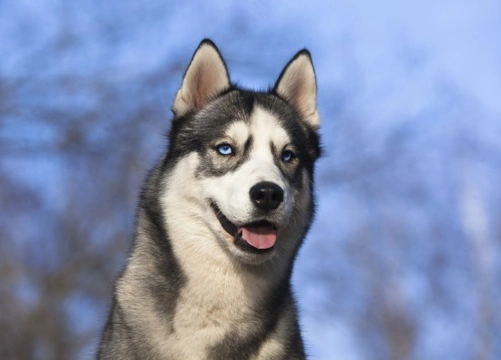
Siberian husky hereditary health and longevity
The Siberian husky is a breed that is becoming progressively more popular within the UK as a pet, but one that can prove a handful to own and that can be challenging to keep within a domestic environment. The Siberian husky is a large, active dog from the spitz dog grouping, and has a very distinctive wolf-like appearance with piercing eyes and an outgoing nature.
Bred to haul sleds and retain their endurance on the move across long and inhospitable distances, the Siberian husky must lead an active lifestyle with plenty of entertainment in order to remain happy. The Siberian husky can stand up to 23.5” tall at the withers and weigh up to 60lb, with males of the breed being slightly larger than females.
The Siberian husky coat is very dense and warm, composed of two layers with a thick undercoat to retain heat and a longer layer of guard hairs for protection from the elements. The husky is a heavy shedding breed that requires lots of brushing and grooming, and that also blows their coat twice a year on top of their regular shedding pattern too.
If you are considering buying or adopting a Siberian husky, it is important to do plenty of research into the breed to ensure that you are not biting off more than you can chew! Finding out about the personality and core traits of the husky is vital, as is finding out about their general health and wellness, which we will cover in more detail within this article.
Siberian husky longevity
The average lifespan of the Siberian husky is 12-14 years, which places the breed towards the top of the average range for all breeds of a similar size and build. This indicates that the husky tends to be a healthy, hardy dog, and is not one that is prone to suffering from a lot of minor ills.
Genetic diversity
The coefficient of inbreeding statistic for the Siberian husky is 6.2%, which falls just within the accepted range for pedigree dog breeds of 6.25% or lower. This indicates that the Siberian husky breed in the UK is well established and diverse, and is not subjected to a high amount of inbreeding.
Conformation
The shape and build of the Siberian husky is fit for work and designed for endurance, and they are a well built, strong and sturdy breed that is not delicate nor considered to be at risk of problems due to their conformation.
However, their very thick, warm coats are designed for cold climates, and the husky is at risk of overheating in hot weather, so special care must be taken to ensure that the dog can keep cool enough when the weather is hot.
Health testing for the Siberian husky
The British Veterinary Association and The Kennel Club monitor the health of pedigree dog breeds, and make breed-specific recommendations for health testing for conditions that are prevalent within each breed, and that may affect the dog’s quality of life.
For the Siberian husky, the following health testing schemes are in place:
- Hip score testing, with the breed’s mean hip score being 7.6. Potential parent dogs should return a hip score below this figure in order to be considered viable.
- Eye testing for conditions including hereditary cataracts, persistent pupillary membranes, and goniodysgenesis.
- DNA testing is available for progressive retinal atrophy.
- DNA testing is available for gangliosidosis, an excess of the GM1 ganglioside in the brain, which causes progressive neurological impairments.
Other health issues
While health testing and pre-breeding screening for the above conditions is available and advised for the Siberian husky breed, it does not pose an exhaustive list of the potential problems that the husky may be susceptible to.
Potential husky buyers are also advised to look into the health of the parents and grandparents of any dog that they are considering buying, in order to develop a fuller picture of the dog’s potential future health.
Some other conditions that the Siberian husky may suffer from include:
- Idiopathic epilepsy, which can often be managed with medication. However, known epileptic dogs should not be used for breeding, as this condition may be hereditary.
- Cataracts of the eyes, although these may be operable to preserve vision.
- Laryngeal paralysis, a condition that can lead to breathing difficulties and exercise intolerance.
- Zinc-responsive dermatosis, which can lead to crusty, scaly skin and hair loss, particularly around the head.
- Various forms of cancers, including mast cell tumours, basal cell tumours, perianal gland tumours and thyroid cancer.
- Pannus, also known as chronic superficial keratitis.
- Uveodermatological syndrome, which is an autoimmune disorder that caused progressive tissue destruction and causes blindness and ultimately, death.
- Spontaneous pneumothorax, air forming within the pleural cavity which can cause breathing difficulties.
- Haemophilia, a blood clotting disorder.
- Depigmentation of the nose, known as Dudley nose.



